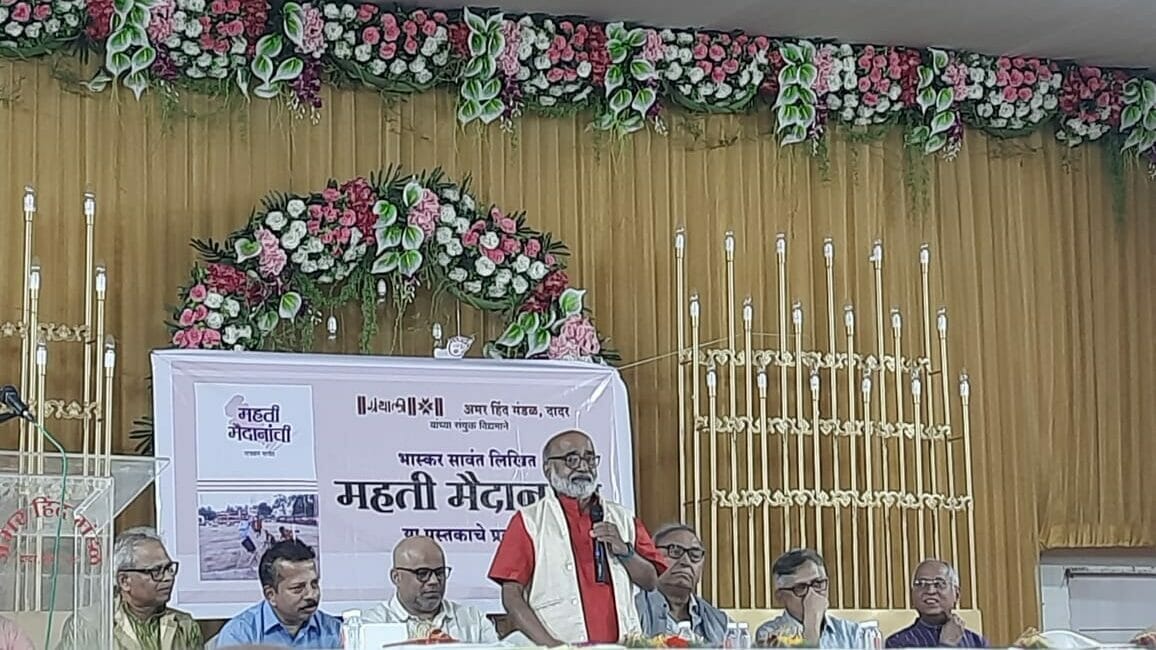Mumbai was once known for local tournaments of games such as Wrestling, Kabaddi and Kho kho, which required minimal infrastructure and were popular among city’s youth. They provided opportunities for the players to succeed at state, national level as well. Lack of open spaces has many repercussions. Particularly worrying is shrinkage of spaces that are dedicated for playing – playing any sports such as Football, Cricket, Hockey, Kho kho. Playgrounds help the younger generations stay fit, active, build team spirit and channelise their boundless energy positively.
Organisations and people have dedicated themselves to save the green cover, preserve mangroves and so on. Amidst all these efforts, is a crucial struggle to save playgrounds. Bhaskar Sawant, who heads the Maidan Bachao Samiti, has been trying every trick in the book to promote sports culture and save playgrounds. He has participated in agitations, organised protests, conducted campaigns, planned sports events, written articles, approached the media, and now has written a book in Marathi, titled – Mahati Maidananchi – loosely translated as “Glory of playgrounds”.
Citizen Matters caught up with Bhaskar, to discuss the idea, state of grounds and citizens’ role in preserving these precious open spaces. Below is an edited interview.

Tell us about the book, Mahati Maidananchi.
Over the years, I have written more than 100 articles about problems and various schemes for sports in various newspapers. This book is a selection of 45 articles among those. They cover history, present conditions and future of playgrounds. I have tried to document some positive efforts and also talk about important players, coaches, sports activists. Most importantly, I have tried to capture what I observed and felt as I witnessed the developments related to grounds, especially in Mumbai, its suburbs, Navi Mumbai and Konkan and western Maharashtra. This is the 45th year of Maidan Bachao movement, that’s why we have 45 short chapters.
What are your major takeaways from this long journey?
During this journey, I have seen that grounds are not available, where they are needed. They are neglected, if available. And where you find good grounds, you don’t find players or users. And even if all these are present, I found that organisations meant for these sports, were not effective. Maharashtra has a longstanding tradition of sports but we have not been able to find heirs to achievers from 1950s and 60s. I have also noticed a difference in sports activists. Professionalism has entered at every stage. While it may seem like imitation of cricket players, it is important to understand that players, coaches, umpires, organisers of other games should get adequate remuneration. Only then sports will truly flourish.
Read more: Mumbai: City planning leaves few open spaces for citizens to breathe free
How did you get involved in the cause of saving grounds?
Over forty years ago, I was involved in the agitation to save St.Xavier’s Stadium in Parel, which was a bustling Mill area with huge population of workers. It was a precious ground which had hosted tournaments for Kho kho, Kabaddi, Volleyball, Basketball and so on. Some attempts to hand it over to real estate developers. Marathi newspaper Maharashtra Times criticised the move and wrote about it on their sports pages. Soon, players, activists and general public got involved and it became a huge movement. We gheraoed the then Mayor Wamanrao Mahadik, and received his full support. The ground was saved. I have been part of the movement since then.
You have been trying to raise awareness for a long time. What are your concerns at present?
Not just Mumbai, but all the cities and towns in various districts of Maharashtra, are getting developed and urbanised. We cannot overlook grounds in this development. Open spaces are the lungs of any city. We must develop and preserve gardens and grounds for the sake of clean air at least.
Also, it is not enough to just save a ground. It is equally important that people use them, play regularly. Maidane khelti rahili pahijet (they should be actively used for sports and games). A game as simple as langadi (hopping) can also revive a sporting spirit among neighbourhoods and communities.
Increasingly, residential complexes have amenities such as badminton courts and swimming pools. Does it impact urban planning policies?
It affects how citizens view their city and what they can do for it. If I never leave my compound, will I get involved with what is outside? If I never use the public facilities, will I try to preserve them? Complexes have small pools and indoor facilities but playing robust games in open spaces is important. When you have more people using grounds or public swimming pools, demanding better quality, administration will take notice and provide.
How are you planning to take your work forward?
I am going to organise meetings with representatives of various sports organisations. Only state or administration is not responsible for development of sports. Citizens’ participation is much needed. NGOs, industrialists, should also do their bit to save the grounds and ensure activities. Only then the culture of sports will take roots and flourish. Save grounds is not just a slogan but it is the right approach and way to develop sportspersons.
(with inputs from Stephin Thomas)